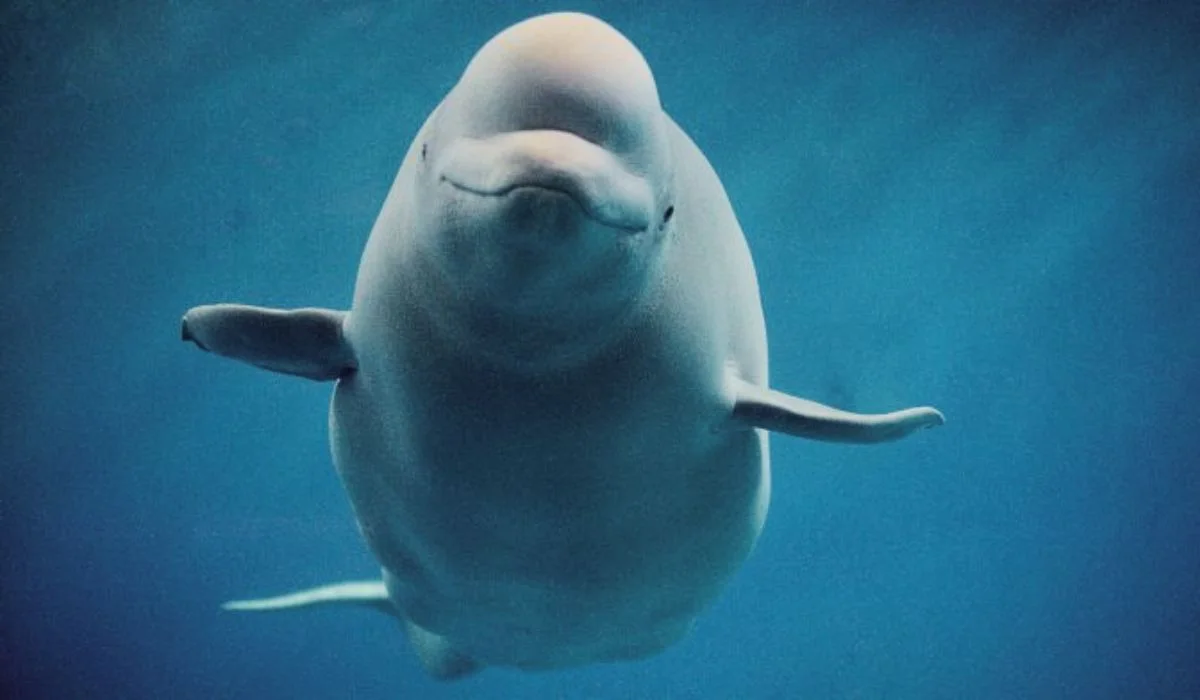A beluga whale named “Hvaldimir,” who gained international attention when he was first spotted in Norwegian waters in 2019 wearing a harness, has been found dead. The whale, believed to have crossed into Norway from Russian waters, ignited widespread speculation about its possible role as a “spy whale” trained by the Russian navy. The beluga was discovered lifeless in Risavika Bay, Southern Norway, by a local fisherman and his son.
Hvaldimir’s body was found floating near Risavika Bay, an area known for its calm waters. The discovery was made by a father and son out on a routine fishing trip when they spotted the whale’s carcass drifting in the bay. They promptly notified authorities, and marine experts were called to the scene.
The whale’s body was retrieved from the water with the assistance of a crane and taken to a nearby harbor where it will undergo examination. While there were no obvious external injuries, the cause of Hvaldimir’s death remains unclear, and an investigation is currently underway to determine what may have led to the tragedy.
A Beluga of International Fame
Hvaldimir first gained notoriety in April 2019 when he was seen by fishermen near Norway’s Ingøya island, close to the Arctic city of Hammerfest. The beluga was wearing a harness equipped with what appeared to be a camera mount and a buckle inscribed with the words “Equipment St. Petersburg.” The harness, combined with the whale’s tame behavior, led many to speculate that he had been trained by the Russian navy, sparking the nickname “Russian spy whale.”

Hvaldimir’s name is a combination of the Norwegian word for whale, “hval,” and Russian President Vladimir Putin’s first name. His story captivated global audiences, and he became an unexpected celebrity. Speculation about his origins led to widespread media coverage, with many theories suggesting that he was either a military asset or potentially used as a therapy animal in Russia.
Life After Discovery
After being spotted with the harness, Hvaldimir spent several years roaming Norwegian coastal waters. He was often seen near small towns and fishing villages, delighting locals with his playful behavior. According to the NGO Marine Mind, which monitored his movements, Hvaldimir showed great interest in humans and appeared to respond to hand signals. His unusual friendliness only fueled further rumors that he had been trained for specific tasks, possibly by the Russian military.
Despite the initial controversy surrounding his discovery, Hvaldimir quickly became a beloved figure in Norway. Locals and tourists alike were fascinated by the whale, who exhibited a high level of intelligence and sociability.
Marine Biologist Reacts to Hvaldimir’s Death
Marine biologist Sebastian Strand, who worked with the Norway-based Marine Mind organization, had been monitoring Hvaldimir’s movements over the past three years. He expressed deep sorrow over the whale’s sudden death.
“It’s absolutely horrible,” Strand said in a statement. “He was in good condition just a day before, so it’s a mystery as to what may have caused this. His loss is heartbreaking for everyone who has followed his journey.”
Strand mentioned that, up until the day before his death, Hvaldimir appeared to be in good health. The whale’s passing came as a shock, leaving those who had come to know him deeply affected. Strand and his team will be involved in determining the cause of death in the coming days.
Hvaldimir’s Legacy
Hvaldimir’s unique story touched the hearts of people not only in Norway but around the world. For years, he captured public imagination due to his unusual background and gentle interactions with humans.
The Marine Mind organization documented his frequent visits to Norwegian coastal towns and reported on his behavior. According to their website, Hvaldimir had an exceptional interest in people, often approaching boats and following hand gestures. These behaviors led many to believe he had spent time in captivity before making his way into Norwegian waters.
Over time, Hvaldimir became a symbol of mystery and resilience. His story was a reminder of the complex relationship between humans and marine life, as well as the ethical questions surrounding the use of animals for military and therapeutic purposes.
Ongoing Investigation
Marine experts are now focused on uncovering the cause of Hvaldimir’s death. An autopsy is being planned, and while there were no visible external injuries on the whale’s body, authorities hope that further examination will shed light on the situation.
Marine Mind and other organizations involved in Hvaldimir’s care have called for patience and respect as the investigation continues. They hope that by studying the whale’s death, lessons can be learned about how to protect and conserve marine wildlife in the future.
Also Read: Defending Champion Coco Gauff Loses To Emma Navarro In US Open Fourth Round

